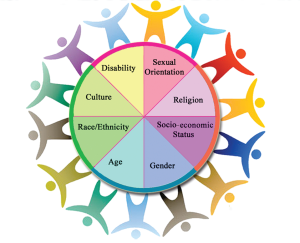di·ver·si·ty
The practice or quality of including or involving people from a range of different social and ethnic backgrounds and of different genders, sexual orientations, etc.
"equality and diversity should be supported for their own sake"
Diversity and inclusivity are essential elements of any successful company. Embracing diversity means recognizing and valuing the differences that individuals bring to the workplace, including their backgrounds, cultures, experiences, and perspectives. Inclusivity, on the other hand, means creating an environment where everyone feels respected, valued, and able to contribute their best work.
Here are some of the reasons why it’s important for companies to prioritize diversity and inclusivity: 
• Better Decision-Making
• A diverse team brings a variety of perspectives and experiences to the table, which leads to more creative and innovative problem-solving. When employees come from different backgrounds and cultures, they are more likely to challenge assumptions and offer alternative solutions that might not have been considered otherwise.
• Increased Employee Engagement and Retention
• Employees who feel valued and included are more likely to be engaged and committed to their work. Inclusivity helps employees feel like they belong and that their contributions are
valued, leading to a more positive work environment. In turn, this can lead to increased employee retention rates, which can save a company money on recruitment and training
• Enhanced Customer Experience
• When a company reflects the diversity of its customer base, it is better able to understand and meet their needs. A diverse team can help a company tailor its products and services to
a wider range of customers, leading to increased customer satisfaction and loyalty.
• Improved Reputation
• A company that values diversity and inclusivity can build a positive reputation as an employer of choice. This can help attract top talent and position the company as a leader in its
industry. It can also help to build trust with customers and stakeholders, leading to increased loyalty and a better reputation in the marketplace.
• Legal and Ethical Obligations
• Many countries have laws and regulations that prohibit discrimination based on race, gender, age, religion, and other factors. By embracing diversity and inclusivity, companies can
ensure that they are meeting their legal and ethical obligations to their employees and customers. This can also help to avoid costly lawsuits and damage to the company’s
reputation.

In conclusion, embracing diversity and inclusivity is not just a moral imperative but a business imperative as well. By prioritizing diversity and inclusivity, companies can benefit from improved decision-making, increased employee engagement and retention, enhanced customer experience, improved reputation, and legal and ethical compliance.



















